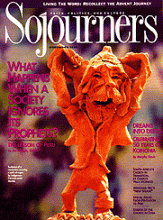Murphy Davis preached the following sermon on April 26, 1992, on the occasion of Koinonia Partners' celebration of its 50th year. Held in Americus, Georgia, birthplace of Koinonia, the celebration was also a gathering of representatives from many faith communities, including Sojourners, who are kindred spirits to Koinonia and its founder, Clarence Jordan. - The Editors
As the Koinonia Community celebrates its 50th birthday, many of us who do not live at Koinonia join with those who do in celebrating the history and heritage of Koinonia. The witness of this community and the writings and teachings of Clarence Jordan have given birth to and nurtured many other communities and ventures in faith. Those of us who understand ourselves as children of the "Cotton Patch" vision join in the celebration of Koinonia's 50 years of life together and witness for the God movement on Earth as it is in heaven.
We've read from the Sermon on the Mount (with a smattering of James) because the sermon is what Clarence called the "platform" of the God movement. Its purpose, he said, was "not to evoke inspiration but perspiration."
You might notice that Clarence often used the word "maturity" in his Cotton Patch translations. Maturity seems like an appropriate topic for a 50th birthday party.
When we celebrate 50 years, maturity is an important issue: It's a time in the human journey to look back, to look forward, to make some clear (often hard) choices; a time to deepen roots, to sharpen focus, and enjoy the fruit of the freedom of being who we are with spontaneity and joy
Read the Full Article

